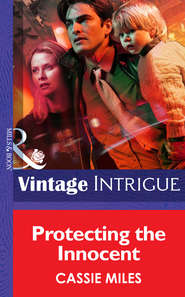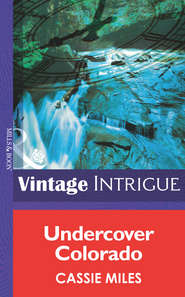По всем вопросам обращайтесь на: info@litportal.ru
(©) 2003-2025.
✖
Mysterious Vows
Автор
Год написания книги
2018
Настройки чтения
Размер шрифта
Высота строк
Поля
Her head was pounding. She raised her fingertips to her temples and massaged lightly. Her forehead felt like it might explode.
“Are you ill?” he asked.
Dying, she thought. The misery spread to her neck and shoulders. Yet she said to him, “I will survive.”
“I don’t understand why your head hurts. I’ve examined you thoroughly. You have some bruises and a cracked rib. But I don’t see evidence of a head injury. Do you have a history of migraines?”
“No, but I need an aspirin. Please. Por favor.“
He took her hand. From a small vial, he tapped a blue-and-white capsule into her open palm and passed her a glass of water that had been standing on a table beside the sofa.
Though the pounding in her head threatened to consume her, she hesitated. What had he given her? A drug that would destroy the remnants of her brain? Suspiciously she demanded, “What kind of pill is this? What will it do to me?”
“I told you before,” he said. “I gave you some of this pain medication last night. I use it for my leg, but it seems to work on your headaches.”
If she’d taken one of these capsules before, she should have remembered. But her memory was gone, erased.
“Take it,” he ordered sharply. “There isn’t time for you to have a headache.”
She didn’t know this man. But the pain behind her eyes was so intense that she would have to risk the medication. She couldn’t begin to think until this agony subsided. She tossed back the capsule and washed it down.
“Listen carefully, Maria. No one must suspect there is anything wrong. Comprende? Do you understand?”
She lay back on the sofa, concentrated on breathing evenly while she waited for the pain to lessen. Why was he calling her Maria? That wasn’t her name. It was... An involuntary sob shuddered her body. Her name was...
Oh, God, why couldn’t she remember this basic, essential piece of herself? Calm down. Try to think.
She heard someone else enter the room. A woman.
In English the woman asked, “Is she all right?”
“She’ll be okay, Alice. Don’t worry.”
“I don’t think she’s well. Last night and this morning, she had a weird, blank look. Like she was awake, but not conscious. You should call off the wedding.”
“Maria will be fine. She’s tough. Comes from a tough country.”
“Well, it looks to me like something more serious than a case of prenuptial jitters.”
“Leave this to me.” His voice was harsh. “I know what I’m doing.”
The woman hovered above her. “Maria?”
She opened her eyes. Though it wasn’t her name, she would be Maria.
“Maria, do you need a doctor?”
“I’ll make that decision,” the man said. “Please leave us, Alice. We’ll be ready soon.”
When the woman backed away, Maria wanted to call out to her, to tell her that she needed a doctor, needed to talk to someone in authority. But what would this man—this stranger—do if she caused a problem?
“You’ll be all right,” the man said. “Close your eyes and let the medication work.”
Gradually the aching began to fade. Her mind felt more clear. She sat up, turning her head slowly so she wouldn’t jar the fragile relief.
The man sat in a wingback chair next to the sofa. In spite of his obvious impatience, he was very handsome. There was an aristocratic sculpting to his features. Near his hairline, where his thick, dark hair swept back off a high forehead, she saw the start of a faded scar that extended to the brow above his left eye.
She sensed that she ought to know him, but her memory didn’t seem willing to function. “Cómo se llama?”
“My name? You want to know my name?”
He regarded her with a mixture of astonishment and irritation. Too angry, she thought, to be a caring husband. Why had he brought her here? Who was he?
Her eyes squeezed shut, then she opened them again. She needed to think, to create logic from the crippling confusion that churned inside her brain, making her stupid, foolish, ridiculous. She had to proceed intelligently if she hoped to survive. Of that much, she was certain.
More information. She needed to gather facts.
The small room where they sat was furnished with dark wood antiques, but the wallpaper was light, patterned in gray fleur-de-lis. Sunlight poured through the lace curtains at the windows. They were alone, but she heard the mumblings of other people outside the closed oak door.
“I can’t call off the wedding,” he said. “I promise that the ceremony will be brief. You can get through it, then go upstairs to your room and sleep.”
“What will I be called,” she asked, rephrasing her earlier question, “when we are man and wife?”
“You will be Mrs. Jason Wakefield Walker the Third.”
An impressive name. But she had never heard it before. “And this will be my home. This...island.”
Outside the windows she saw scrub oak and pine. There were only a few wildflowers in splashes of yellow and red. The foliage was not typical of a tropical island where Spanish might be the native tongue, and yet she had spoken only Spanish.
“Please, Maria, try to concentrate.”
“Upon what? Tell me again.”
He sighed and began speaking in a low baritone. In spite of his obvious irritation, the sound of his voice was gentle and soothing.
Though she tried to listen and compile enough data to understand, a darkness rose up behind her eyes and she could feel herself tuning out. Was her delirium an effect of the capsule he’d given her? She stared blankly while he mentioned immigration and their enemies. In a dull voice, he concluded, “It is your assignment, today, to convince our guests that you are delighted to be my wife.”
A swell of organ music resounded from the opposite side of the closed door. “The Wedding March.” Surely she was dreaming.
Her fingers laced in a tight knot on her lap. The worst of the headache had ebbed. “I am feeling much better,” she said.
“I’m glad.” He sounded sympathetic, but his tightly clenched jaw and frowning eyebrows told another story. “Let’s get this over with, shall we?”
He certainly didn’t behave like a person who was about to be wedded. On the other hand, neither did she.
Maria... She repeated her new name to herself. I am Maria. And Maria had no time for marriage. There was her career to think of. She couldn’t just run off and get married. It would be unprofessional. She’d worked hard to develop her contacts, to become a...
A what? What did she do for a living? In her mind, she envisioned bookshelves, papers on a desk. When she tried to read the pages, to find a clue, the wind blew swiftly through the open window beside the desk and the sheaves of paper drifted and swirled like so many leaves caught in autumn breezes. And the wind came faster. Her mind filled with a white paper storm, and she was cold. Blank. Unable to remember.











